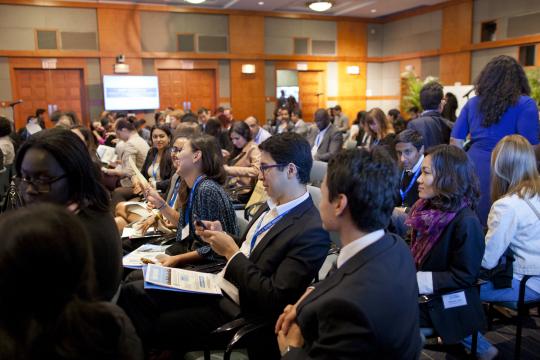
Four years ago, I became part of the newly formed Global Youth Anti-Corruption Network (GYAC). It was then a group of about 50 civil society leaders, journalists, and musicians (or “artivists”) who, using various methods, are fighting corruption in their home countries. I was part of the pack of six journalists. After a week of training and networking in Brussels, I came home to the Philippines more inspired and energized than I could remember. I was baptized and inducted into the anti-corruption world, but could a freelance writer be really tipping the scale in ending corruption?
I continued writing, and one day I decided to gather a group of young leaders from various high schools and communities in my hometown. I thought I was starting a revolution, but I didn’t know what I was doing. All I knew was that this work takes a village. This quote from American anthropologist Margaret Mead resonated with me: Never doubt that a small group of thoughtful, committed citizens can change the world; indeed, it's the only thing that ever has. It speaks certain truths and insights that were true for me and hopefully for many young people wishing to make a difference in governance:
Start small. But do start. Every situation is an opportunity and an invitation to take action -- in school, at work, or in any organization or community -- the decisions on various issues that governments make on our behalf affect us on a daily basis, and we need to make our voices heard. Find out what platforms and entry points may already exist for government-citizen interaction and collaboration; if there aren’t any, lobby for them. Look around and join groups that may already be pursuing your interests. The value of shared advocacy, rather than working in isolation, is possibly one of the single most powerful weapons of effective campaigning. (This is a topic I wrote about for the Global Corruption Report on Education).
Think before you act. One thing I learned was that everyone wanted to fight corruption, but they didn’t know how or where to start. With friends from GYAC and Global Changemakers, we wrote an anti-corruption toolkit. Organizing and mobilizing like-minded people is one side of the coin; the other is planning and executing a well-oiled strategy, with steps often involving promotions, fundraising, and monitoring and evaluations. While this may sound daunting, no one size fits all, and toolkits are just for inspiring, starting, and customizing your own efforts; the rest is up to your creativity. Other organizations such as Transparency International has since also published their own anti-corruption toolkit for young activists.
It takes commitment. Anything worth doing requires passion and perseverance, and often it takes a very long time before we see the results of our efforts. But this is exactly why we need young people involved in governance: we have the passion, the ideas, and innovations in such large supply, and we have the most to lose when governments are not open and responsive. This work demands volunteers, or people who will do it out of sincere commitment over any other kind of compensation, because often that’s the only way to jolt the system and make a difference. (This was very true with the case of the recently concluded World Bank Group Youth Summit on Open and Responsive Governments, organized by volunteer young professionals throughout the Bank Group.)
Like any other experiment, the youth group I started in my hometown four years ago has had failures and successes, but it has since evolved to promote the anti-corruption toolkit in different schools as part of an international project called Transparency Talks between the Philippines and Paraguay, and later, of the social accountability initiative CheckMySchool. The experience taught me many things, but most of all to be stubborn, to never lose faith, and to remember: People who claim they don't let little things bother them have never slept in a room with a single mosquito.


Join the Conversation